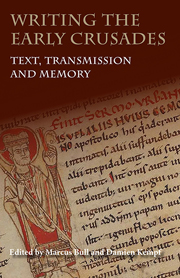Book contents
- Frontmatter
- Contents
- Acknowledgements
- List of Contributors
- List of Abbreviations
- Introduction
- Baldric of Bourgueil and the Familia Christi
- Guibert of Nogent, Albert of Aachen and Fulcher of Chartres: Three Crusade Chronicles Intersect
- Understanding the Greek Sources for the First Crusade
- The Monte Cassino Tradition of the First Crusade: From the Chronica Monasterii Casinensis to the Hystoria de via et recuperatione Antiochiae atque Ierusolymarum
- Nova Peregrinatio: The First Crusade as a Pilgrimage in Contemporary Latin Narratives
- What Really Happened to Eurvin de Créel's Donkey? Anecdotes in Sources for the First Crusade
- Porta Clausa: Trial and Triumph at the Gates of Jerusalem
- The Historia Iherosolimitana of Robert the Monk and the Coronation of Louis VI
- Towards a Textual Archaeology of the First Crusade
- Robert the Monk and his Source(s)
- Rewriting the History Books: The First Crusade and the Past
- The Ideal of Knighthood in English and French Writing, 1100–1230: Crusade, Piety, Chivalry and Patriotism
- Index
The Historia Iherosolimitana of Robert the Monk and the Coronation of Louis VI
Published online by Cambridge University Press: 05 May 2014
- Frontmatter
- Contents
- Acknowledgements
- List of Contributors
- List of Abbreviations
- Introduction
- Baldric of Bourgueil and the Familia Christi
- Guibert of Nogent, Albert of Aachen and Fulcher of Chartres: Three Crusade Chronicles Intersect
- Understanding the Greek Sources for the First Crusade
- The Monte Cassino Tradition of the First Crusade: From the Chronica Monasterii Casinensis to the Hystoria de via et recuperatione Antiochiae atque Ierusolymarum
- Nova Peregrinatio: The First Crusade as a Pilgrimage in Contemporary Latin Narratives
- What Really Happened to Eurvin de Créel's Donkey? Anecdotes in Sources for the First Crusade
- Porta Clausa: Trial and Triumph at the Gates of Jerusalem
- The Historia Iherosolimitana of Robert the Monk and the Coronation of Louis VI
- Towards a Textual Archaeology of the First Crusade
- Robert the Monk and his Source(s)
- Rewriting the History Books: The First Crusade and the Past
- The Ideal of Knighthood in English and French Writing, 1100–1230: Crusade, Piety, Chivalry and Patriotism
- Index
Summary
The First Crusade captured the medieval imagination on an unprecedented scale. In addition to several letters composed by participants while still on the expedition, four eyewitness narrative accounts were circulating throughout western Europe by c. 1110. These, in turn, inspired the production of a number of ‘second generation’ chronicles and vernacular histories in the first half of the twelfth century. It is difficult to think of another event in the Middle Ages that piqued this level of literary interest. As a result, historians have long sought to understand the relationship between the sources, in particular the process of narrative transmission from the eyewitness accounts to their offspring. A bulk of attention has focused on the Gesta Francorum, the most famous eyewitness account, and the three chronicles based on it: those of Robert the Monk, Baldric of Bourgueil and Guibert of Nogent. Since all three men were Benedictine monks writing in close temporal and geographic proximity, the prevailing consensus is to combine them together into a genre of monastic crusading chronicles. Scholars have concentrated their efforts on understanding the various ways in which these three monks, taken as a set, reworked and refined the vulgar language of the Gesta Francorum to fit better within a western religious framework.
The shared theological motive of these authors is plain. And yet, these texts also differ in their treatment of crucial (if sometimes minute) details.
- Type
- Chapter
- Information
- Writing the Early CrusadesText, Transmission and Memory, pp. 105 - 115Publisher: Boydell & BrewerPrint publication year: 2014

